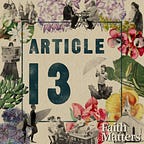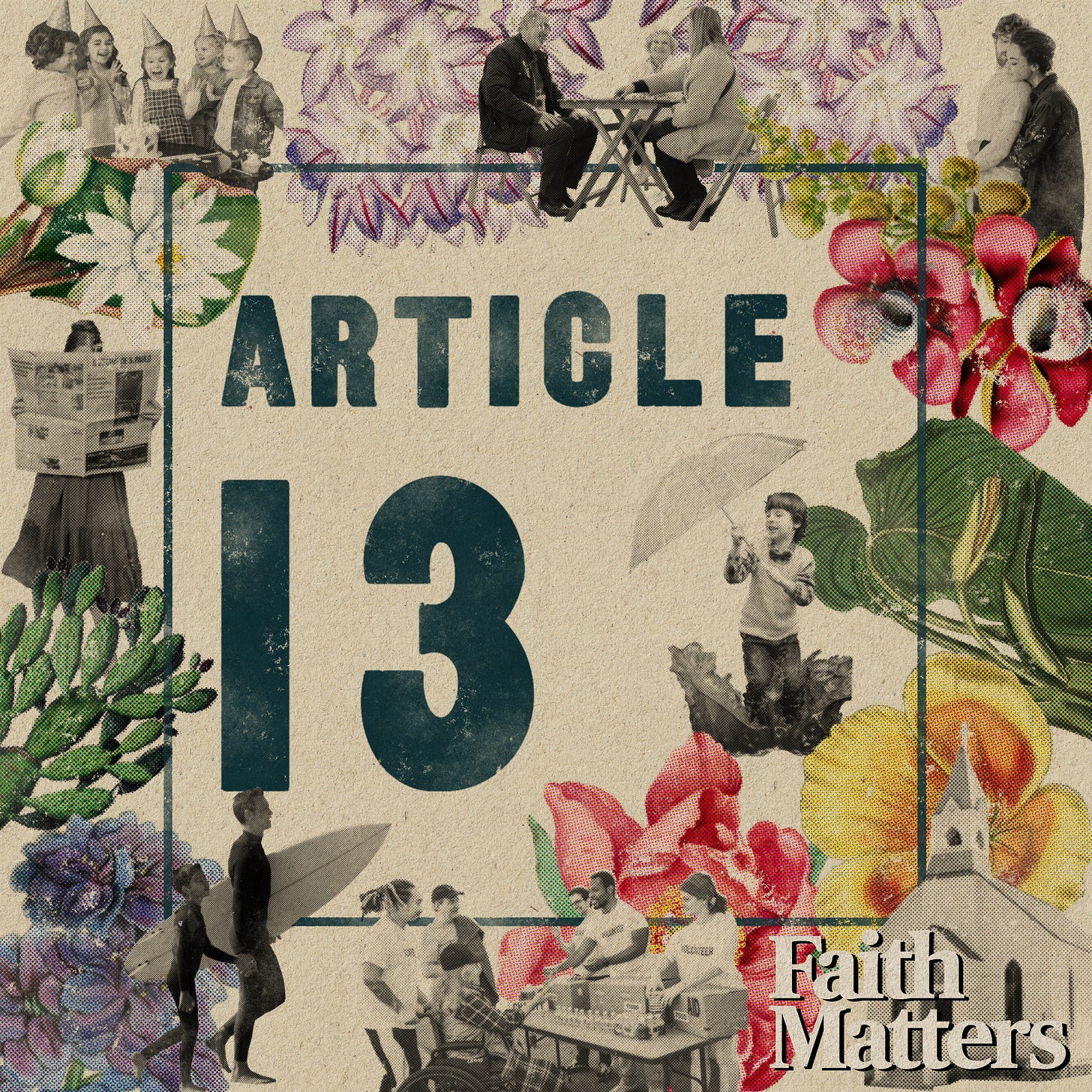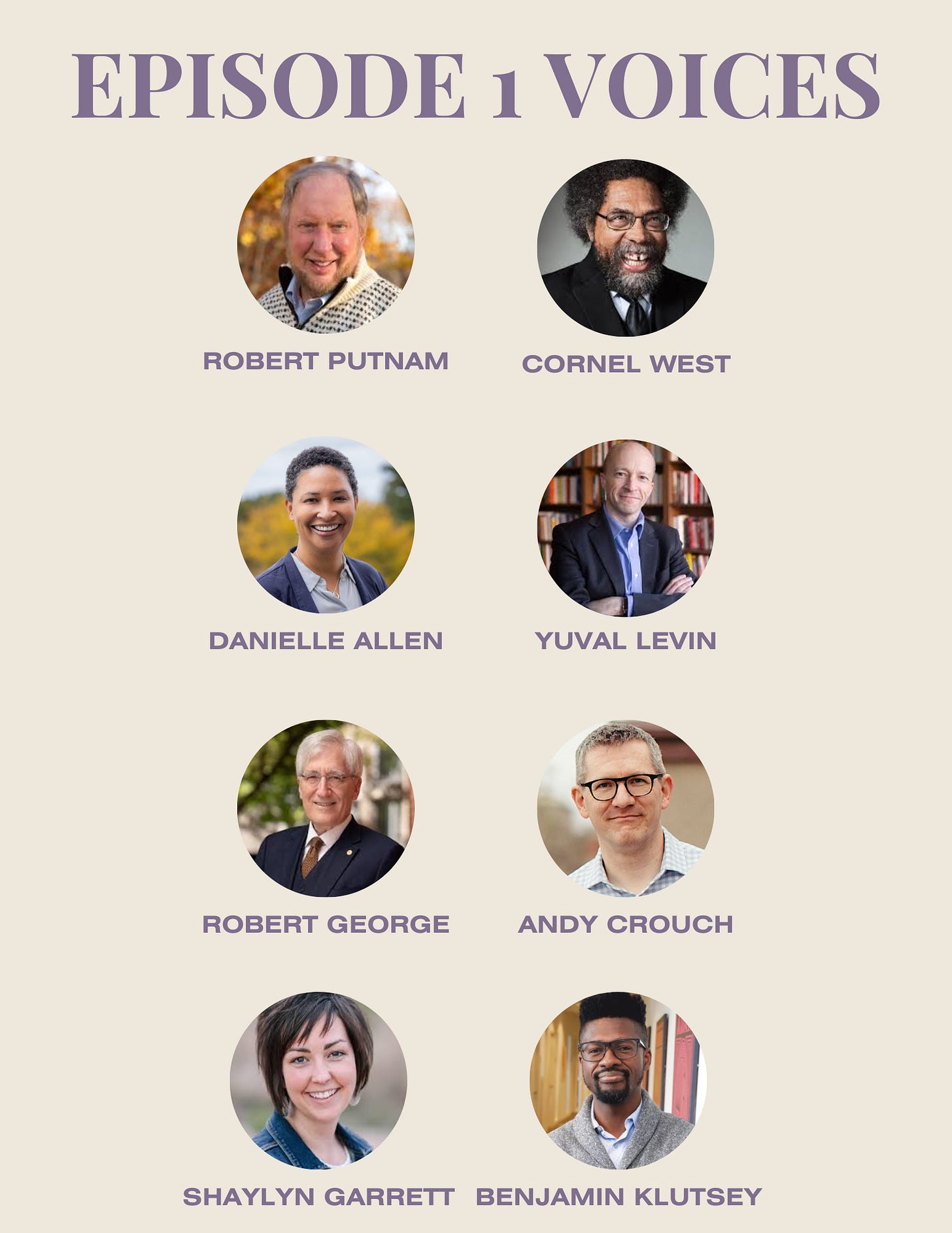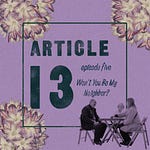Today we’re sharing with you the first two episodes of Article 13, a new narrative podcast from Faith Matters that brings together cutting-edge research and spiritual wisdom to offer blueprints for a better world.
American society is fractured across political and cultural lines. Healing will not happen quickly or easily, but will require a sustained commitment to peaceful discussion and the development of new, creative frameworks for finding common ground.
Hosted by Zachary Davis, Article 13 features deep-dives into vital social issues, extraordinary guests, and beautiful sound design. It aims to model the kind of hopeful, intelligent discourse our country needs—and to offer ways that each individual listener can start the healing, right where they are.
The name of the show (as you might have guessed) is inspired by the 13th Article of Faith:
“We believe in being honest, true, chaste, benevolent, virtuous, and in doing good to all men; indeed, we may say that we follow the admonition of Paul—We believe all things, we hope all things, we have endured many things, and hope to be able to endure all things. If there is anything virtuous, lovely, or of good report or praiseworthy, we seek after these things.”
EPISODE 1
Our first episode looks at why Americans are losing trust in most of their major institutions, including the institutions of government and democracy. This distrust is driven in large part because Americans realize that many people in those institutions have started seeing them as a platform rather than a responsibility. We can help rebuild the institutions to which we belong — families, churches, schools, local communities — by recommitting ourselves to the people we serve within them.
The episode features some extraordinary voices, including:
You can listen to Episode 1 above, or on Apple Podcasts or Spotify:
EPISODE 2: FOR MANKIND
Our second episode explores the ways that American boys and men are facing growing challenges in school, in the labor force, and in our culture. Richard Reeves, author of Of Boys and Men, documents those challenges and the steps it will take to solve them — which include a new cultural script for masculinity.
Many of our cultural spaces are suspicious of masculinity itself; others celebrate only that masculinity which conforms to the traditional model of strength and dominance. A powerful new script would be one that celebrates the desire for strength as it is used in service to others.
Featured voices:
LISTEN TO EPISODE 2
Article 13 is produced by Maria Devlin McNair, Zachary Davis, and Gavin Feller. Music is by Steve LaRosa. Art is by Charlotte Alba. You can learn more about Article 13 here.
We express our thanks to the Wheatley Institute for their support.
EPISODE 1 TRANSCRIPT
Intro
Cornel West: “I think it's deeper than civility, and it's even deeper than respect. I think we've got a genuine love for one another. I love this brother. I revel in his humanity.”
In 2006, a student at Princeton University invited Professors Robert George and Cornel West to sit down for a joint interview. It was meant to be an hour-long conversation. It turned into a life-changing friendship.
Robert George: Well, it means everything. He's one of my dearest friends in the world and I love him like a brother. We truly are brothers. He often says, you know, “A friend isn't the right word for brother Robbie and myself.” And he's absolutely right. There's a certain kind of fraternal bond there. I feel he just understands me like almost nobody in the world does.
The unusual thing is that Robert George and Cornel West really live on opposite sides of the political spectrum. West, who once sought a presidential nomination from the Green Party, is strongly left-wing and progressive. Robert P. George, who was appointed by President George W. Bush to the President’s Council on Bioethics, is one of America’s most noted conservative intellectuals. But they feel their differences actually strengthen their bond.
Robert George: I want to learn from Cornel. He has things to teach me. I have things to learn, even when he's wrong about some things. I want to know what his reasons are, because they're going to deepen and enrich my understanding, even if he's not actually correct.
The other thing is that their friendship came to strengthen their university.
Robert George: We got a message from the Dean of the College at Princeton who's in charge of the freshmen seminar program. And she said, “This freshman seminar program is really important. We promise the incoming students that at Princeton, you're going to be taught, even as freshmen, by top scholars and famous [] but the trouble is, of course, nobody's signing up [] to teach them.” So I said, “Gee, wouldn't it be great if Cornel and I would just do this to have another [] this conversation.” So that's exactly what we did. And it was a huge success.
Their institution had a problem. West and George had a responsibility to help. And because of their relationship, they could create a remarkable solution.
Yuval Levin: So I think that the answer to that looks like what's required to strengthen any of the institutions you care about, which is to begin with, to ask yourself, what you owe the people with whom you share that institution.
This is Yuval Levin. He studies institutions of all kinds in his role as the Director of Social, Cultural, and Constitutional Studies at the American Enterprise Institute. And in particular, he looks at why institutions matter so much, why American institutions have been struggling, and how they can be rebuilt. It turns out that the story of rebuilding has a lot in common with the story of this friendship.
Welcome to Article 13 – a podcast that brings together cutting edge research and spiritual wisdom to provide blueprints for a better world. I’m your host, Zachary Davis. In this episode, we learn how our personal choices and relationships, even at the smallest level, can help rebuild institutions, those largest, frequently unloved, but vitally important building blocks of our society.
Rising Polarization, Declining Social Trust, and Loss of Trust in Institutions
US political history has been studded with notable cross-party friendships – Republican president Ronald Regan and Democrat House Speaker Tip O’Neill, Republican House Speaker John Boehner and Democrat President Barack Obama, conservative Supreme Court Justice Antonin Scalia and liberal Justice Ruth Bader Ginsberg. In this decade, however, it’s partisan animosity that dominates the landscape.
Ben Klutsey: You ask people, “ Do you trust []”, 70% of Americans, both in the Republican party and in the Democratic party, would say that they do not trust folks in the opposing party.
This is Ben Klutsey, Director of the Program on Pluralism and Civil Exchange at George Mason University, speaking with Heterodox Academy in 2022. That same year, Pew Research Center released a report showing that growing shares in each party now describe those in the other party as more closed-minded, dishonest, immoral and unintelligent than other Americans. A major reason for party affiliation is the belief that, quote, “the opposing party’s policies are harmful to the country.” CUT
As polarization has risen, trust in other people in our society has fallen.
Ben Klutsey: Social trust is the trust that or the sense that our fellow members in society will follow certain established norms, and on that survey, you will see that there has been a significant decline in social trust. It used to be about 50% when they started the survey in, I think, the 1960s, now it's roughly 30%.
Yuval Levin sees how this loss of social trust has taken all kinds of tolls.
Yuval Levin: We're living through a time that feels like a kind of social crisis. You can see it in our politics as polarization or a kind of bitter culture war. You can see it in people's personal lives as a sense of alienation and [loneliness,] isolation that pervades a lot of people's lives. That shows up in rising suicide rates, that shows up in an epidemic of opioid abuse. These problems seem like they're connected, but it's not actually obvious exactly how, and I think it becomes a little more obvious when you think about the question through the lens of institutions.
For Levin, institutions are more than a form of bureaucracy or management system. They’re a way that people live life together.
Yuval Levin: I would say that institutions are the durable forms of our common life. They're the shapes and structures of what we do together, so that an institution is not just a bunch of people, but it's a bunch of people who are organized around a common purpose. And that purpose gives each of them a role in relation to the others and in relation to that common goal.
Today, however, people increasingly lack those roles.
Yuval Levin: Because a lot of what's happening is a degradation of those social forms, those things we do together, so that people are not just disconnected from each other, they're lacking ways to organize the things we want to do together; and that means tha, by the absence of a role, by the absence of something to belong to, to feel affinity for, to feel loyalty to, the loss of trust in all of those things that belong to us in common, we come to feel like our society's not functioning. And I think that just becomes a lot easier to see when you see the problem through the lens of declining institutions.
American institutions are declining in terms of the trust they command. A 2022 Gallup poll measured Americans’ confidence in institutions ranging from schools and the media to the supreme court and organized religions. The poll found that Americans’ current trust in major institutions was at its lowest level since 1979.
There’s another reason why social trust is declining, beyond political polarization. It’s that we don’t trust the institutions that are meant to shape the other members of society.
Yuval Levin: I think we trust institutions because it seems to us that they do mould powerful people toward serving a common goal and a common good. When you think about how an institution shapes people, often that has to do with creating a set of behaviors and obligations that keep them from doing the wrong thing. You think about a doctor as a human type, a doctor or someone who takes their obligations to a patient very seriously, and there are things a doctor would never do. And that's what institutions do for us. They impose a set of standards, and it's not just in the professions. They turn us into a certain kind of person. So if I'm driving and someone cuts me off, and I'm sitting in my car and want to yell [] what I think, if my kids are in the back, I'm not gonna do that, right? And that is a way in which parenthood constrains you, because there are things that a father just wouldn't do. The loss of the sense that that's true is the loss of our trust in institutions, and I think we have lost that sense in relation to a lot of our institutions in American life. And as a result, we've lost the ability to trust them.
Why Have Trust and Institutional Strength Declined?
So what factors are behind this loss of trust? Why don’t we feel that institutions have that shaping power anymore?
Yuval Levin: I think what's really distinct about our time is that we've come to think differently about what our institutions are for. So that rather than seeing them as formative, as giving shape to the people within them, defining a certain kind of human character, instead we increasingly come to think of institutions, not as moulds like that, but as platforms, as places to stand and be seen and heard in our culture, so that people use the institutions they're part of to build their own following, to build their own brand, and oftentimes to display themselves voicing the right opinion in the culture war. The obvious examples may be to begin with are in politics.
In 1958, reports Pew, “about 75% of Americans trusted the federal government to do the right thing almost always or most of the time.” In 2023, by contrast, “Currently, fewer than 20% of Americans say they trust the government in Washington to do what is right “just about always” or “most of the time.” And this may be because Americans see politicians using the government for their own self-display rather than for the people.
Yuval Levin: You know, the Congress has a job to do. The president has a job to do, the courts have a job to do, but to an increasing degree, they're all doing the same work, and it's not the job of any of them. It is just a kind of partisan culture, war combat. And exactly what the difference is between what Congress is supposed to do and what the President is supposed to do, for example, has become harder to see, because they've each lost sight of their distinct responsibilities. And so I think a recovery of those kinds of institutional boundaries and characters is necessary for a recovery of the constitutional system – because it's a system that demands a lot from citizens and from leaders. And what it demands is responsibility, a sense of ownership, and a sense of constraint and of boundaries. Those are all shaped by strong institutions, and I think seeing that those institutions have grown [] can help us see why responsibility's been lost too.
Institutions decline when we stop taking responsibility for our roles and duties within them. And we stop taking responsibility when we stop identifying closely with the people those duties are meant to serve – when we stop thinking of ourselves as a “we.”
Yuval Levin: There's no cohesion, there's no solidarity. You know, in some ways, there's a kind of pendulum that operates in this way. Robert Putnam, the social scientist at Harvard, has a new book out called The Upswing that tells this story in a powerful way.
The big factor - shift from “We” to “I”
In their 2020 book The Upswing, How America Came Together a Century Ago and How We Can Do It Again, Robert D. Putnam and Shaylyn Romney Garrett chart changing levels of political trust, economic equality, social cohesion, and cultural solidarity - the degree to which Americans think of themselves as a single unit. What they found, looking at data from the late 1800s to the 2000s, was that all these measures tended to rise and fall together.
Robert Putnam: Here I put all four of those charts together, and you can see they're not separate charts, it's one … it shows that in economics, politics, society, and culture, America went through one huge swing.
The huge swing looked like this: in the Gilded Age of the late 1800s, American politics were gridlocked by factional division; economic inequality was rampant; and the culture was highly narcissistic. But the Progressive Era ushered in greater levels of social cohesion and cultural communitarianism – which drove rising levels of economic equality and political cooperation. All these indicators rose and rose until the mid 1960s, when they all began to fall again. Putnam and Garrett called this “I-we-I” curve. All these measures of progress and well-being rose as Americans thought of themselves more and more as a community, a “we.” But those measures fell again as Americans embraced a more self-centered individualism.
Ultimately, say Garrett and Putnam, the lesson to be learned from American history is that our success depends on accepting our responsibilities to the group – on thinking in terms of “we.”
Shayln Romney Garrett: This quote from Teddy Roosevelt is something that really summarizes what we feel like is the lesson of the I-we-I we century. Roosevelt said, “The fundamental rule of our national life–the rule which underlies all others–is that on the whole and in the long run, we shall go up or down together.” Good or bad, whether we recognize it or not, we are in this together as a mass multicultural democracy.
Yuval Levin comes to a very similar conclusion. If we had to pinpoint one root cause for the decline of all kinds of institutions, it would come down to this issue of “I” versus “we.”
Yuval Levin: We've come to think of ourselves as individuals, out there on our own, building our own brand, rather than as belonging to larger wholes in which we have a part to play, belonging to the institutions. Trust is a function of the sense that we serve the purpose of the institution and not just our own ends. And when that becomes less clear, it becomes harder to trust that institution. So I think there are obviously a lot of causes for the decline of the strength, the integrity of our [institutions], but I think that decline of responsibility is really at the center of it.
How to solve the problems and shift back to “we”
Declining institutional trust leads to lower social trust, lower social and civic engagement, and greater loneliness, isolation, and division. All of this is corrosive to our democratic government and our individual flourishing. The good news is that you don’t need a lot of institutional power to start making things better. There are transformative actions that we as ordinary citizens can take right now – actions we must take.
Yuval Levin: You have to start where you are and think about, “What can we change here before we can talk about transforming the world?” You know, we've gotta fix the problems we confront right where we sit.
Putnam and Garrett found that the country’s first big shift from “I” to “we” was largely driven by the capital-p Progressive movement. That movement achieved its success by starting with smaller changes at the local level.
Shayln Romney Garrett: So if we are looking for solutions today, we really believe that we need to get really local, we need to start in our neighborhoods, we need to start in our cities, we need to start right where we are.
We start rebuilding our institutions by taking action locally. And that action starts with our own relationships. Thinking in terms of “we” will come much more easily if we actually have strong connections with the people included in that “we.” We can begin changing society by changing our relationships with family and friends.
Family
Yuval Levin: The family is really the core institution of any society, and it helps us to see what institutions do, because the family is fundamentally formative of the people in it, right? It's the way in which children are formed into functional human beings and better citizens.
The family is another vital institution we need to strengthen. And the way we do this, Levin says, is the same way you strengthen any institution: by recommitting to the responsibilities you have within it.
Yuval Levin: So I think that the answer to that looks like what's required to strengthen any of the institutions you care about, which is to begin with, to ask yourself what you owe the people with whom you share that institution. Ask yourself the question, “Given the role that I have here, what should I be doing?” And in the case of the family, that means as a mother or a father, as a son, or a daughter, as a grandparent or an uncle. Ultimately, families break down because we forget what we owe one another
Rebuilding family can help rebuild other institutions because family life is so foundational to what we do in the world.
Yuval Levin: The family not only organizes what we do together, but shapes who we are and shapes our []. That's why family's so critical and it's why the decline of family forms can create such chaos in society, can make it so hard for people to know where they belong, what their role is, what their responsibility is. It's very difficult for people to thrive, whether in their working lives, in their civic lives, as students, if they don't have functional families. And so for a lot of the other problems we need to solve, we have to think about how to strengthen the family.
Family is so powerful, in fact, that changing family life in Washington changed the dynamic of the national government. This is psychologist Jonathan Haidt in a 2013 talk at the Hauenstein Center, explaining why Congress has become more polarized and less functional since the 1990s.
Jonathan Haidt: It used to be [that] Congressmen and Senators actually lived in Washington, which meant that their spouses had all sorts of activities together and their kids went to school together, they were at parties together. Gingrich said, “No more of this, no more fraternizing with the enemy.” He changed the calendar so that now all business is done from Tuesday afternoon through Thursday morning just about, so nobody needs to live in Washington, you fly in Monday night, you fly out Thursday evening, and he said don't get a house here, don't move your family here, so since Gingrich, since that time, very few of them live there anymore, they rent a place with other members of their party, they do battle for two and a half days a week , and they go back to their district where they speak with people on their side. So there's been a complete change in the social order [] Washington. Imagine this incredibly complicated machinery that the Founding Fathers gave us with two steering wheels and two brake pedals and [], two houses and two parties, it's so complicated, and it's somehow it worked for almost 200 years, for 200 years, well, it failed a couple times, it works for a long time because there's the motor-oil of friendships and human relationships. That's what politicians are great at, they're generally very warm people with very good personal skills. So you take this really complicated machine and you open the plug and you say, “No more motor oil, no more lubricant, no more personal relationships,” all the oil drains out, the machine seizes up, and that's where we are.
When politicians shared family life, they shared friendship. And when they shared friendship, our political system functioned better. If we want our constitutional republic to start functioning again, what we need may be “citizen friendships.”
Ben Klutsey: Robert Talisse … wrote a book called Overdoing Democracy. In that book, he says, you know, democracy is a wonderful thing, and politics within democracy is also a good thing, because it allows us to advocate for our positions, to champion the ideas that we care most about, but politics can saturate our lives in ways that can become extremely contentious, and we've gotten to that point where we are at that very very contentious place, where politics is everywhere, in everything that you see, and he suggests that in order to get back to civil discourse, in order to get back to trusting one another, we have to find ways to do things with other citizens that have nothing to do with our politics, and he calls that trying to explore “citizen friendships.” And I think that's a good place to begin, that each of us will have to figure out ways in which we can engage with our friends, our neighbors, people that we don't know. When you sit on a plane, don't be annoying, but you can interact with someone very peacefully. And Ithink it's really a bottom-up experience, it's not something that can be forced on us top-down, but we all have to do our little bits.
The point, again, is that we as individual citizens can do something to remedy social division – that there are some things only individual citizens can do.
Louise Hawkley: Tracy Crouch, I don't know if you remember, she was the first Minister for Loneliness in the UK, and they have this statement which I think is spot-on: Government can't make our friends for us, and ultimately the challenge of creating a more connected society lies with each of us, in our families, neighborhoods, and workplaces.
This is research scientist Dr. Louise Hawkley, speaking on loneliness and distrust at the Lee Kum Sheung Center for Health and Happiness in 2023. She discussed the links between personal relationships and institutional distrust. When people had low levels of trust in other people and in institutions, they tended to withdraw and disengage socially. On the other hand, when people were forced to engage socially with others, it improved those low levels of institutional distrust.
Louise Hawkley: This was study that Stanford [] and what this was, as you see here, a gathering of over 500 voters from across the country, diverse, they wanted everything represented, so they had different genders, ages, colors, ethnicities, and political persuasions, and they brought them together … and polls that were measured before and after showed that polarization went down, and the more extreme people were in their polarization to begin with, the greater the reduction. You see that Democratic participants showed a mean increase of 13 points in warmth of their feelings toward Republicans, and if they were really polarized it went up 16 points, and the same thing for Republican participants… so that the researchers attributed this to changes to the contact between groups, because people with the most extreme feelings were those who had had the least if any contact with anyone else prior to that experience.
Polarization flames the hottest where people have no friends outside their own group. If we want to lower polarization, restore a mentality of “we,” and help institutional leaders fulfill their responsibilities, we can start by committing to what may be new kinds of friendships. If that sounds like an impossible ask – if you can’t imagine being in relationship with someone who doesn’t share your most fundamental values – remember two things. First, you can still respect strong values even if they’re not the same values. This is Robert George and Cornell West again.
Robert George: Well, I not only love Brother Cornel, I admire him. and I admire him for those virtues, for honesty and for integrity. He sets an example for me. He's inspiring to me. We may disagree about politics. But I do admire integrity: a person who says what he means, means what he says.
Second, remember that maybe the most fundamental values are exactly the ones you do share. Maybe it’s just the way of realizing them that you disagree on.
Robert George: Now, conservatives and people on the left would have different policy prescriptions, but they're fundamentally about means and not about ends.
Cornel West: You know, I think one of the things that brings us together is this fundamental commitment to looking at the world through spiritual and moral ends, so that even at disagreements about policies, with our politicians and so forth, that, I think in the end, there is a
deep similarity in terms of our commitment to the least of these, a commitment to the orphan and the widow and fatherless and motherless and poor.
This is the truth that Danielle Allen, Harvard professor of political science, came to realize when she witnessed intense political disagreements in her own family. Those disagreements sat atop a deep shared commitment to certain values and goals.
Danielle Allen: When I was a kid, I used to sit and listen to my dad and my aunt, and lots of you have probably heard me talk about this before – my dad, conservative and always smoking a pipe, pipe smoke curling around his head.
This is Allen at a 2024 talk at the Harvard Kennedy School.
Danielle Allen: And my aunt was this big woman [] a Mack truck, she was, she was in the 70s living with another woman, which in black culture at that time was a tough, hard thing to be doing, and just committed to social justice, activism, et cetera … They would just go at it hammer and tongs at the dinner table… Despite the intensity, it was always clear to me as a kid that they had each other's back, come what may. Also, they shared a project of empowerment for themselves, their families, and communities.They weren't sure about how exactly they were going to get there, but they were clear on ensuring those things. That was enough, that is, just the kind of sacred connection to the person in front of them, obviously family connection, you gotta kind of broaden that out in the sense of sacred human dignity of the person in front of you – they have this shared purpose around empowerment.
It may be that you also share a driving purpose, a fundamental goal, with people you don’t share a political label with. Maybe that’s a commitment to helping those who have less. Maybe it’s a goal of making schools safer or making it easier for parents to take care of their kids. That could be something you discover, if you make an intentional point of reaching out to a family member who belongs to a different party, or striking up a conversation with a parent who votes differently from you on the school board. And if you find yourself in friendship with someone in the “other group” and discover their good will, it won’t be quite as hard to extend a little more trust to that other group. It becomes easier to believe that people there could have the same good will as your friend.
Religion
Institutional decline can seem like a problem of the largest scale. After all, it’s institutions that structure our common life at the highest levels. But what it takes to sustain those institutions starts at the most intimate levels. Andy Crouch, partner for theology and culture at Praxis, described this dynamic in a 2022 conversation with Trinity Forum, using the metaphor of the canopy.
Andy Crouch: I turned to the metaphor of canopy, first because of this very influential book in sociology of religion called The Sacred Canopy by Peter Berger, who argued that actually, human beings perhaps to survive and thrive have to ultimately feel that when they look up the heavens, they experience a kind of sacred canopy, that there is some way to trust what's going on in this seemingly wild and chaotic world. And then I realized there's this very interesting detail about Jewish weddings, which is that they take place under a canopy, the chuppah, right, which interestingly has to be outdoors. You can't get married, if I understand accurately, you can't get married inside, or if you get married in a Jewish wedding hall, there's an open space, we're open to the sky, but with a canopy over the couple, and I think that's such a powerful metaphor, that we we have to step out into the wildness of creation under the huge sky, but then we create this canopy of trust where two people initially, and then perhaps the children they beget and so forth, can shelter. It seems to me the basic work of repair for the next, for the rest of my lifetime, certainly, probably for several generations, because I think these canopies have been eroded in all kinds of ways by modernity, is for us to rebuild, at many different scales, but certainly starting with our closest relationships, the canopies of trust where human beings do not go into the world fundamentally fearful, fundamentally ashamed, fundamentally on edge, but actually go into the world sensing there is room to be human here.
When we’re able to trust in a canopy of love that our most intimate relationships provide – relationship with God, with family, with friends – we’re better able to venture beyond that canopy into the larger world, to extend trust and rebuild relationships in our churches, our schools, and our government. And that’s why we can rebuild the country by starting with our closest communities.
This is what Yuval Levin believes too, that we can rebuild institutional trust by starting with the people and institutions closest to us. At first, the changes will be small and local. But ultimately, they will create the change that we need.
Yuval Levin: When you see the problem in the terms that I've described here, you see that it has to start with individual choices. And I do think that solutions start with people really asking themselves, Given my role in this institution, what should I do? How should I make this decision?” That seems like a small thing, but if it were done more, even a little more, in a lot of our core institutions, the difference it would make would actually be very []. And the sense that the problem we have is that lack of responsibility is an important place to start.
“What should I be doing here? What do I owe these people and how should I make the decision that's in front of me?” To ask that kind of question so that when you face a decision in life, you're not just asking, What do I want?” but also “What am I responsible for and what do I owe the people around me?”, you begin to make the institutions you're part of stronger/
You have to begin by remembering what we owe one another.
CREDITS
Cornel West and Robert George | Firing Line with Margaret Hoover, PBS | Feb 7, 2020
Personal interview with Robert George | July 2020
Interview and webinar with Yuval Levin | Wheatley Institute, Brigham Young University | 2020
Robert D. Putnam and Shaylyn Romney Garrett, The Upswing: How America Came Together a Century Ago and How We Can Do It Again | Family Action Network | Feb 12, 2021
Cornel West and Robert George, interview | American Enterprise Institute | Jan 31, 2017













